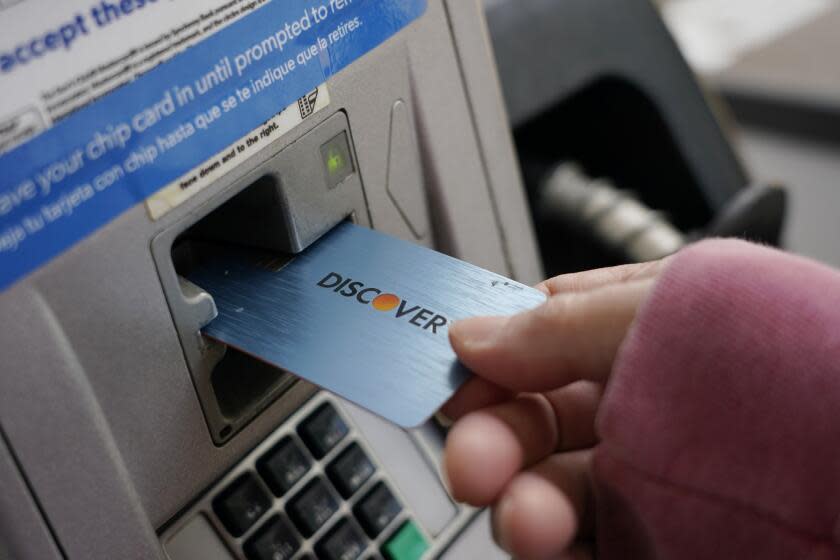What does the Capital One-Discover deal mean for you?

Capital One Financial Corp. announced Monday that it had reached an agreement to acquire Discover Financial Services for $35.3 billion, instantly creating a financial behemoth should the deal be approved by regulators.
The merger would combine one of the largest issuers of Mastercard and Visa cards with Discover's network of cardholders. However, such a mega-merger immediately raised antitrust concerns, as well as questions over how it might affect customers.
Here are some early answers to key questions.
Will I still be able to use my Discover card?
The proposed merger could take a year or more to gain regulatory approval, so in the immediate term don't expect any changes as it's reviewed. The companies have not yet disclosed how they might change their product mix. It's possible Capital One might issue new Discover cards highlighting its name instead of Discover's bright orange "O" logo — similar to how it issues its Visa and Mastercard credit cards.
However, don't expect your card to go away. Capital One is buying a valuable asset.
What if I use a Capital One Visa or Mastercard?
Capital One is one of the largest issuers of Visa and Mastercard credit cards in the nation and that is not expected to change, at least for some time. Michael Rhodes, chief executive of Discover, said the deal "brings together two strong brands with enhanced ability to accelerate growth." However, the Wall Street Journal reported that Capital One plans to migrate some Visa and Mastercard holders to Discover.
Read more: They earn nearly $200,000. Can they afford to have kids in SoCal?
If I can keep my existing credit cards, what is the thinking behind the deal?
Capital One has grown rapidly since it was founded in 1994 and is now one of the nation's largest banks. A big part of that growth has been its issuance of credit cards by the nation's two leading card networks, Visa and Mastercard, with a focus on subprime customers who carry balances. Now, with Discover, it would also own its own network, similar to how American Express issues its own cards.
What is the advantage for Capital One of owning a credit card network?
Discover, originated by Sears in the mid-1980s to get into the financial services business, has a network of 70 million merchant acceptance points in more than 200 countries and territories, according to the deal announcement. Capital One said the deal is a "key foundation" in its "quest to build a global payments company."
Still, Discover is the smallest of the four U.S. global payments networks, also trailing American Express. The merger could result in its expansion, providing more competition to Visa and Mastercard, which are sometimes referred to as a duopoly, said Ian Katz at Capital Alpha Partners.
What are some of the downsides to the deal?
Consumer advocates are wary of large mergers, especially in the financial services industry, contending that consolidation can lead to higher costs for consumers in the form of interest rates and fees, whether in the insurance, mortgage or credit card markets. Also, critics say, larger financial institutions tend to have inferior customer service. Discover, which has focused on prime customers with better credit ratings, has a reputation for superior customer service.
Is anyone opposing the merger?
The National Community Reinvestment Coalition immediately came out against the deal, noting that a report last week by the Consumer Financial Protection Bureau found that small banks and credit unions offered credit cards with significantly lower interest rates than large banks in the first half of 2023.
"This deal is not likely to create public benefits that outweigh its adverse effects. On that basis, we're opposing it and would encourage regulators to block it," NCRC Chief Executive Jesse Van Tol said.
Also, there was concern from Senate Democrats, including Ohio Sen. Sherrod Brown, chair of the Senate Banking Committee, who vowed to closely monitor the deal so it "doesn’t enrich shareholders and executives at the expense of consumers and small businesses.” Sen. Elizabeth Warren of Massachusetts came out in opposition.
How will shareholders make out?
The merger is structured as an all-stock deal, with Discover shareholders receiving 1.0192 Capital One shares for each of their Discover shares. That would give Discover shareholders a 26.6% premium, based on Discover's closing price of $110.49 on Friday. When the merger closes, Capital One shareholders would own about 60% of the combined company, and Discover shareholders the rest.
What is the chance that such a large merger will be approved by regulators?
The deal could come under increased scrutiny by the Office of the Comptroller of the Currency (OCC) under a proposal last month by the regulator to give it more time and expand its criteria for reviewing mergers. That follows an announcement last summer by the Federal Reserve that indicated it also may strengthen merger oversight after the crisis last year that saw the failures of Silicon Valley Bank and other regional lenders.
Does Capital One have anything to worry about?
Capital One was fined $80 million by the OCC in 2020 for lapses in its failure to establish what it called "effective risk assessment processes" prior to moving information technology operations to the cloud — and then failing to correct the deficiencies in a timely manner. It was previously fined $100 million in 2018 by the regulator for deficiencies in the bank’s anti-money-laundering program.
What about Discover?
The company has just gone through management turmoil. CEO Roger Hochschild resigned in August after the company said that it misclassified some credit card accounts into its highest pricing tier as far back as 2007, which resulted in merchants being charged more for accepting the cards for payment. The board vowed to improve the company's governance.
Bloomberg News contributed to this report.
This story originally appeared in Los Angeles Times.
